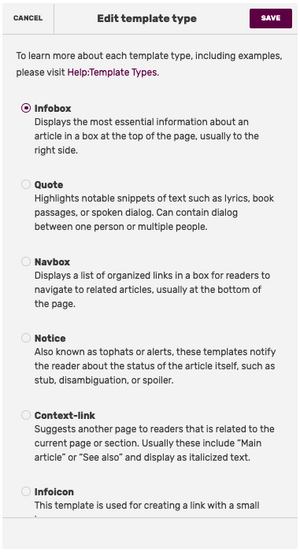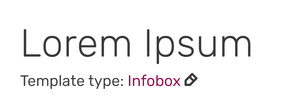Throughout 2015, Wikia has been hard at work improving the world of templates. Templates are a huge component in creating and sharing content on Wikia and have literally hundreds of purposes and designs.
We have tried to accomplish two things with templates this year. First and foremost, we've tried to make them more portable. Portability means that you can read content easily on any device, whether it's desktop, mobile web, mobile apps, or other second screen experiences. Tools to help with this include Portable Infoboxes and Flags. We've also been trying to make sure admins have more tools to understand and organize their templates better, through better editing interfaces and some of the information presented on the Insights platform.
Wikia isn't done moving forward with templates yet and we anticipate this work will continue well into the coming year. But in planning our next steps for improvement, we face a unique problem.
As I mentioned, templates come in many, many varieties. The sheer volume of options means that it's hard to easily, quickly, and accurately know - whether you're a human reading the code or a program analyzing the wikitext - what the exact purpose and design of a template is.
To help tackle this issue for our engineers and our community alike, we've been ramping up a project called Template Types. Its goal is simple: assign a type to every template on every community. Essentially, it involves giving each template a classification such as 'infobox', 'navbox' or 'quote'.
Advantages of Types[]
With all templates classified we can start to offer some interesting benefits for both our users and for our portability initiatives.
With more consistent types, we will be able to deliver better editing experiences for different styles of templates, such as smarter syntax highlighting depending on the markup you'll likely use, template prefills when creating a new template from scratch, and even better ways to browse and import the most popular templates across the Wikia network.
This will hopefully also lead to more powerful article editing as well, such as suggesting templates to insert based on categories and similar templates used; a better, more template-specific "insert" flow for VisualEditor; and preventing certain templates from being inserted onto certain namespaces.
In the portability realm, a better understanding of what general purpose or type each template is will allow us to build classification-specific displays for our multi-device world. Take pull quotes for example. Right now, there is no way for our mobile skin to explicitly know that a template given is meant to be pulled out of the page and displayed prominently. With our minimal CSS approach to mobile, a pull quote template is likely to display text inline at normal size. If we can be made aware that a transcluded template is indeed a quote, we can display it differently than an infobox.
One feature, available today, is Special:Templates. This new tool will list all templates on your community and will let you quickly search and filter to find the exact template you’re looking for.
How It Works[]

Choosing a type is easy with this simple interface
Types will be a new piece of data, not a MediaWiki category. This project will not change the wikitext of a single template or article page by even a single byte. This relies on storing the data under-the-hood and won't get in your way.
To classify a template, you will see the feature under the article name on the template page and in the right rail of the editor when you're editing a template. Clicking the pencil icon will open the tool to select from the list of options. We'll also show the feature when you create a new template.
Some of the current types are:
- Infobox — Displays the most essential snippets of information about an article in a box, most commonly at the top right of an article page.
- Navbox — Provides a list of organized links for readers to navigate to similar articles, most commonly at the bottom of an article page.
- Quote — Highlights notable snippets of text, such as lyrics, book passages, or quotes.
- Citation or reference — Organizes and standardizes the display how sources of content on an article page are annotated.
A full list of the types currently available for classification can be found on the help page.
How You Can Help[]

A small line on the template page will let you know if the template has been classified yet
Our call to action is simple! Start classifying!
Template Types is available today on each and every English-language community, and users who have the ability to edit a template page have the ability add a type. It only takes a few seconds of your time and it can have a tremendous, positive long-term impact on how your community will be displayed in the future. Wikia will also be designing a tool that is able to automatically classify templates. The more human-verified examples we have, the more accurate that tool will be out of the gate.
You can view a list of all templates on your community needing a type assigned by viewing the new list in the Insights feature.
Finally, we need your feedback! As mentioned, the list of available Template Types is open to further expansion based upon examples and requests by the community. In addition, we mentioned a number of ways we anticipate using classified templates in the future. Are there other ways we could use this data to help improve your Wikia editing or reading experience? Let us know!
Click here to follow the Fandom staff blog.
Click here to sign up for the From the Desk of Community email newsletter.
Join our Official Discord server for registered editors!
